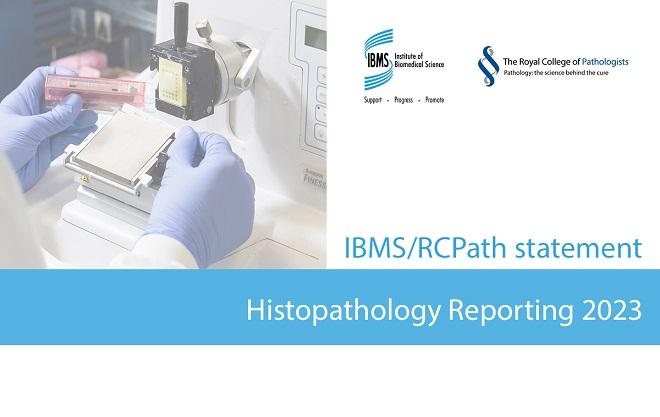IBMS and RCPath histopathology reporting statement 2023

The IBMS and RCPath have collaborated to produce an updated joint statement and accompanying practice and competency information on advanced roles in biomedical scientist reporting
The updated IBMS and RCPath joint statement - The role of scientists in histopathology reporting - reflects the developments for advanced roles in biomedical scientist reporting since May 2017. The Scientist reporting of histopathology samples: practice and competencies document has also been updated.
Opportunities for scientists in advanced roles is well-established in cellular pathology. Biomedical scientist reporting of abnormal cervical cytology screening cases has been accepted practice for 20 years and more than 110 scientists have passed the cytopathology exam to be eligible to undertake cytopathology reporting.
Biomedical scientists undertaking histopathology reporting will work alongside pathologists as part of an integrated reporting team and will be able to dissect, independently report and present cases at multi-disciplinary team meetings in their specialism of gynaecological, gastrointestinal, or skin histopathology.
These roles will be a key part of an integrated clinical pathology team that is able to deliver a flexible and efficient service to improve patient outcomes.
IBMS President Debra Padgett said:
Advancing the biomedical scientist scope of practice is a necessary part of our evolving professional and service needs.
Histopathology laboratories have been under considerable pressure, and demand for services is increasing. The IBMS and RCPath joint qualifications not only help to allay these pressures but enable developments in diagnostics, monitoring and therapy in cancer to assist in future-proofing NHS cancer services.
As biomedical scientists increasingly undertake advanced roles and their scope of practice changes and develops considerably from their original point of registration, we must applaud the dedication and commitment of those undergoing this rigorous training and aim to increase the number of biomedical scientists dissecting and reporting.
Our collaborative relationship with RCPath is proving very effective and our joint efforts are beginning to have lasting and beneficial effects on patientcare.
RCPath President Professor Mike Osborn said:
The histopathology workforce faces long standing and acute pressure, leading to a backlog of patients waiting for diagnosis.The College has campaigned long and hard for investment to grow the medically trained histopathology workforce and continues to do so very actively at every opportunity.
As well as campaigning for sustainable expansion of these medically trained pathologists, and in line with other specialties throughout healthcare such as endoscopy, emergency medicine, general practice and prescribing, RCPath has and continues to support the appropriate development of the role of biomedical scientists and their extended training to include the histopathological reporting of cases from pre-determined body systems. This includes gynaecological, gastrointestinal, and skin.
Since the introduction of the joint RCPath and IBMS histopathology reporting qualification in 2016, 16 biomedical scientists have successfully completed its rigorous training course and 72 more are in various stages of training and are expected to qualify over the next four years.
The success of the training programmes and new roles is the result of the strength of our collaborative relationship with the IBMS and the establishment of our conjoint examination boards.


